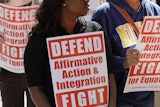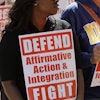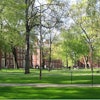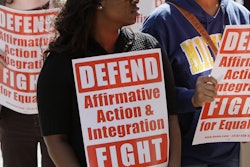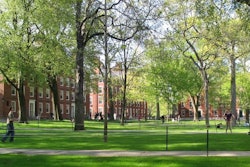Professor: Use Social Unrest to Change Admissions Policies
By Christina Asquith
New York City
In 1960, the “big three” universities — Princeton, Harvard and Yale — admitted only a handful of Black students each year. But the rioting sparked by the assassination of the Rev. Dr. Martin Luther King forced the schools to rethink their admissions policy. By 1970, all three were integrated, with Princeton admitting 103 Black students. The gains made at those schools haven’t yet diminished.
A recent lecture at New York University’s Steinhardt Institute for Higher Education Policy explored how the societal unrest of that period helped open the doors of Ivy League universities to Black students, and how it could serve as a blueprint for future social activism.
“Movements and struggles sometimes do lead to social change and tangible differences,” said Dr. Jerome Karabel during the lecture.
With a burgeoning immigrants’ rights movement afoot, Karabel’s diagnosis is both a recipe for activism and a portent of vigilantism. He sees the recent predominantly Hispanic protests as having strains of a new civil rights movement but, without the same social pressures or headline-grabbing violence, they may prove ineffective. Furthermore, the barriers to college today for immigrants are neither race nor ethnicity, but money, he says. Even as discontent over tuition costs swell, Karabel says colleges seem less responsive than ever.
The heart of Karabel’s thesis is that the violent riots in Los Angeles, Newark, N.J., Washington, D.C., and other cities were the catalyst for change in the ’60s. Using charts, Karabel showed that the enrollment of Blacks at Harvard, Princeton and Yale went almost unchanged throughout the late 1950s despite the U.S. Supreme Court’s decision on Brown v. Board of Education, ending official segregation. Enrollments also remained unchanged throughout much of the ’60s, even as civil rights legislation, sit-ins and peaceful protests swept the country.
However, after King’s assassination in 1968 sparked rioting in 125 cities across the country, the universities took heed and in the following two years, Black enrollment shot up. In 1960, the big three universities enrolled a total of 15 Black students. Ten years later, more than 280 Black students were part of the freshman class.
Karabel, a sociologist at the University of California, Berkeley, spent three years interviewing admissions officers and combing through historical records, school newspapers and alumni reports in his research. His lecture was based on his book, The Chosen, in which he tells the history of admissions at the big three — and what that process reveals about the history of privilege and values in America in the 20th century.
The Chosen is a history of the college admissions process that challenges the notion of higher education as a meritocracy. For instance, the schools started requiring personal interviews and essays in the 1920s to weed out Jewish applicants, and started admitting women out of fear of losing male applicants. Karabel argues that pressure in the late 1960s to appeal to students’ desires for a diverse campus was the strongest factor motivating admissions officers to accept larger numbers of Black students.
“Now, Princeton’s snobby elite image is ‘out’ and they want a brand change in order to stay competitive,” he said.
According to Karabel, Harvard sent out teams of admissions officers in 1969 to recruit Black students from the inner city. Then, 40 percent of Black students at Harvard came from the inner city. Today, they show little effort to integrate by class.
“There was greater class diversity at Harvard 55 years ago than now,” Karabel said. “You have to ask, what’s happening here? We’ve had radical change in gender, a moderate change in race but no change in class. The difference is that women organized and Blacks organized. But the poor never organized.”
© Copyright 2005 by DiverseEducation.com
